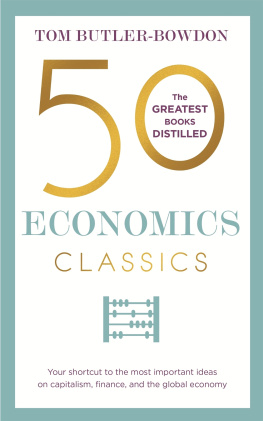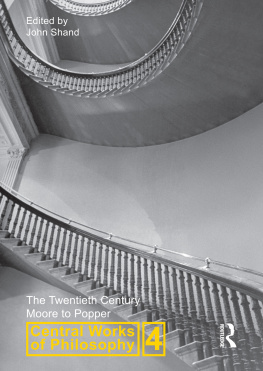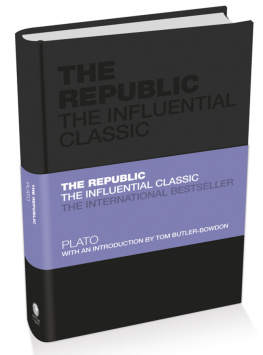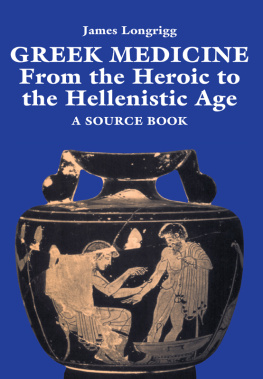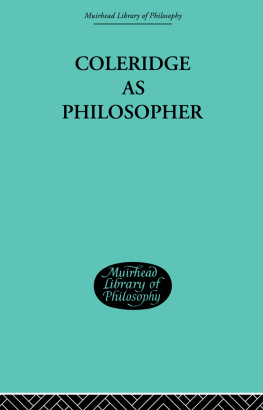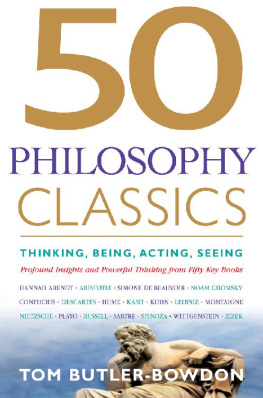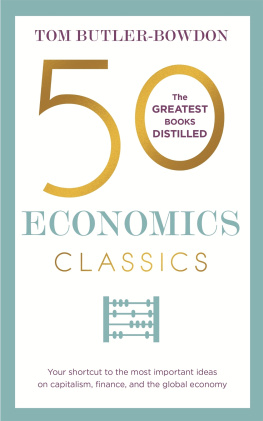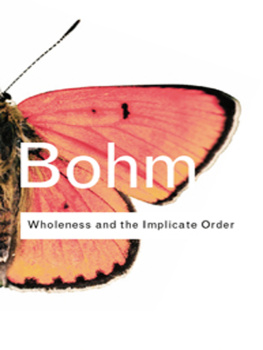Praise for
50 Philosophy Classics
This book explains and discusses briefly, but with remarkable lucidity, some of the ideas of fifty philosophical thinkers from ancient times to the present day. Complex views on a whole range of important and enduring issues are made accessible to the general reader. A sympathetic account is given of each thinker and his or her thoughts, conveying the insights and capturing some of the excitement of seeing the world and human life from novel, distinctive, or unusual perspectives. The book is both enjoyable and instructive.
C.L. Ten, Professor of Philosophy, National University of Singapore

by Tom Butler-Bowdon
The 50 Classics series has sold over 300,000 copies
50 Self-Help Classics 978-1-85788-327-5
50 Success Classics 978-1-85788-333-6
50 Spiritual Classics 978-1-85788-349-7
50 Prosperity Classics 978-1-85788-504-0
50 Psychology Classics 978-1-85788-386-2
50 Philosophy Classics
Thinking, Being, Acting, Seeing
Profound insights and powerful thinking from 50 key books
Tom Butler-Bowdon

First published by
Nicholas Brealey Publishing in 2013
35 Spafield Street | 20 Park Plaza |
Clerkenwell, London | Boston |
EC1R 4QB, UK | MA 02116, USA |
Tel: +44 (0)20 7239 0360 | Tel: (888) BREALEY |
Fax: +44 (0)20 7239 0370 | Fax: (617) 523 3708 |
www.nicholasbrealey.com
www.butler-bowdon.com
Tom Butler-Bowdon 2013
The right of Tom Butler-Bowdon to be identified as the author of this work has been asserted in accordance with the Copyright, Designs and Patents Act 1988.
ISBN: 978-1-85788-596-5
eISBN: 978-1-85788-944-4
British Library Cataloguing in Publication Data
A catalogue record for this book is available from the British Library.
All rights reserved. No part of this publication may be reproduced, stored in a retrieval system, or transmitted, in any form or by any means, electronic, mechanical, photocopying, recording and/or otherwise without the prior written permission of the publishers. This book may not be lent, resold, hired out or otherwise disposed of by way of trade in any form, binding or cover other than that in which it is published, without the prior consent of the publishers.
Printed in Finland by WS Bookwell.
Contents
Introduction
Philosophy is at once the most sublime and the most trivial of human pursuits. It works in the minutest crannies and it opens out the widest vistas. It bakes no bread, as has been said, but it can inspire our souls with courage; and repugnant as its manners, its doubting and challenging, its quibbling and dialectics, often are to common people, no one of us can get along without the far-flashing beams of light it sends over the worlds perspectives.
William James, Pragmatism
The word philosophy comes from the Greek philo (love) and sophia (wisdom). Both as a discipline and as a personal outlook, philosophy is about the desire to think, exist, act, and see in better ways to get at the truth of things.
The Oxford English Dictionary defines philosophy as the use of reason and argument in seeking truth and knowledge of reality, especially of the causes and nature of things and of the principles governing existence, the material universe, perception of physical phenomena and human behaviour. In other words, philosophy is high-level thinking to establish what is true or real, given the limits of human thought and senses, and the implications of this for how we act.
While philosophy has multiple strands, its focus on what we can really know is perhaps its most salient feature. The disciplines constant questioning of assumptions has annoyed many, even its own practitioners Philosophers have raised a dust and then complain they cannot see, George Berkeley said yet in our age, with its seemingly increasing extremes and uncertainty, philosophys focus on what can be known comes into its own. Indeed, as Nassim Nicholas Taleb points out in The Black Swan, it is what we do not know that matters, because it is always the unforeseen that changes our world, both personal and public.
Perhaps the greatest divide in philosophy is between those who believe that all our information must come from the senses (the empirical, materialist view) and those who believe that truth can be arrived at through abstract reasoning (the rationalists and idealists). The first camp has a long lineage, from the second-century skeptic Sextus Empiricus to the Englishman Francis Bacon and Scottish Enlightenment thinker David Hume, and to the twentieth-century logical positivists, including A.J. Ayer and philosopher of science Karl Popper. The second camp counts among its number Plato (his theory of nonphysical Forms that undergird the universe), Descartes (his famous separation of mind and matter), and Kant (who resurrected the idea of moral law in modern philosophy). The purpose of this book is not to tell you who is right, but to lay out some of the ideas and theories of note to help you make up your own mind.
As William James observed in Pragmatism, philosophers like to believe that they are erecting impartial and accurate systems to explain human action and the universe, when in fact philosophies are expressions of personal biases and outlooks. Philosophy is made by philosophers imperfect people offering their version of the truth. Yet this is what makes it interesting, and this book, as well as describing some of the key philosophical theories, also tries to give a sense of the people who devised them. To what extent was their thinking simply a projection of their own minds, or did they get to the heart of something universal?
Since I have already written books on the classic writings in psychology, spirituality, and personal development, the most valid question for me was what philosophy provides that these fields do not. After all, because it has an experimental methodology, many believe that psychology is a more trustworthy discipline when it comes to human questions. However, as Wittgenstein noted in Philosophical Investigations, scientific method can sometimes hide a lack of conceptual depth. What is reality? What does it mean to be a human? What is the meaning of life? Philosophy is the only real meta discipline, Nietzsche claimed, made to consider the totality of things. While it might be said that theology and spirituality are designed for such questions, they lack the neutrality that is needed for a real discipline open to all-comers.
This is not to say that philosophy is scientific. Bertrand Russell noted that it is the business of science to know more facts, while the work of philosophy is to establish valid conceptions and laws through which science can be seen. Rather than science enveloping philosophy (a belief of the physicist Stephen Hawking), it is philosophy that can help put raw data and scientific theories into a larger context. Science is after all a very human project, and if it is the attempt to make our theories fit nature, then it is human nature with which we first have to contend. To know what we are looking at, we must be aware of the lens through which we view it; that is, how we see the world. We know, for instance, that the old Newtonian perspective on the universe, with its focus on matter, no longer copes with the strange, fluid reality that quantum physics suggests. Philosophy is well equipped to look at these uncertainties because of its focus on objectivity and consciousness itself. The twentieth-century particle physicist David Bohm had to turn to philosophy to explain the movement of electrons under his microscope. It was not possible to construe the world in terms of mind looking at matter, he concluded; rather, consciousness is at least as important an element in the working of the universe as is matter itself. In this book I look at these and other fascinating matters in more depth.


